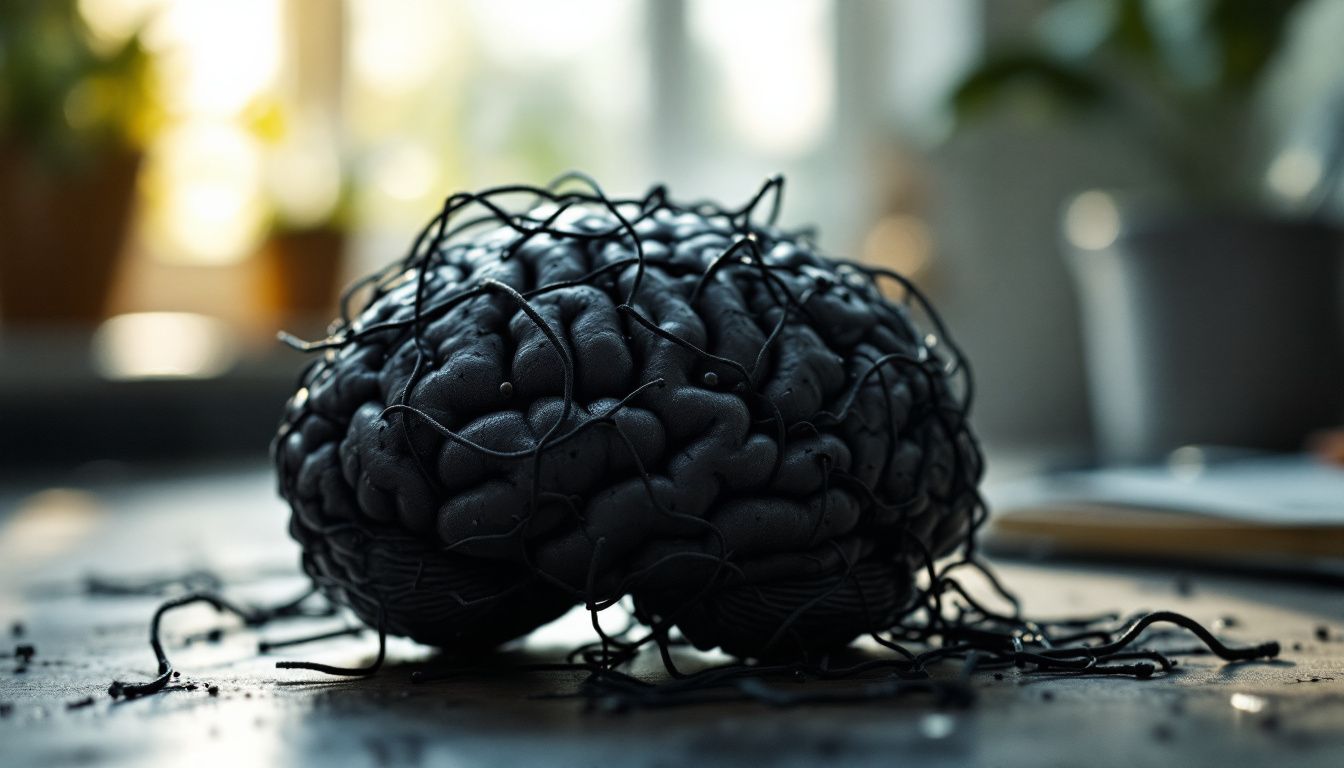Memory problems can be frustrating and scary. Did you know silent strokes might be behind some of these issues? These tiny, unnoticed strokes can damage your brain over time, leading to memory loss and thinking troubles.
Thank you for reading this post, don't forget to subscribe!Keep reading to learn how they affect your brain—and what you can do to protect it.
Key Takeaways
- Silent strokes harm the brain without clear symptoms. They affect memory, thinking skills, and may raise dementia risks like Alzheimer’s disease.
- These hidden strokes are common in older adults. Studies show up to 20% of them experience silent strokes.
- Repeated silent strokes cause long-term cognitive decline. Brain scans often reveal damage linked to memory loss and attention problems.
- Prevention includes routine check-ups, a healthy diet, exercise, quitting smoking, managing blood pressure and cholesterol levels.
- Early medical intervention using medications or lifestyle changes can reduce stroke risks and protect brain health over time.
Understanding Silent Strokes

Silent strokes occur without obvious symptoms. They can damage the brain and impact cognitive abilities, learning, or memory.
Definition and prevalence
A silent stroke happens when blood flow to the brain is blocked but shows no clear stroke symptoms. Many people don’t know they’ve had one. These strokes are more common than most think, affecting up to 20% of older adults, according to studies.
They often go unnoticed until a brain scan picks them up. Damage from these strokes can build over time and might lead to memory problems or thinking issues. Without treating conditions like high blood pressure or atrial fibrillation, the risk increases significantly.
Over 10 million silent strokes may occur globally each year—often hiding in plain sight.
Impact on cognitive function
Silent strokes can harm cognitive health without clear stroke symptoms. These tiny strokes often damage areas in the brain linked to memory and thinking skills. Over time, this leads to memory loss, attention problems, and slower thinking.
Brain scans frequently reveal these silent injuries after they’ve caused unseen damage.
Repeated silent strokes increase the risk of dementia or long-term cognitive decline. They slowly erode critical brain functions like short-term memory and focus. Experts connect them with diseases like Alzheimer’s and vascular dementia.
This hidden danger makes early detection through routine check-ups vital for protecting brain health.
Risk Factors and Consequences
Silent strokes often occur without warning, yet they leave behind hidden brain damage. Over time, this can lead to thinking problems and memory issues that may worsen.
Contribution to cognitive decline
Silent strokes can damage tiny parts of the brain. Over time, this damage may build up, affecting areas that control memory and thinking. People might not notice these strokes immediately because there are no obvious stroke symptoms.
The harm caused by silent strokes raises the risk of cognitive decline. It can interfere with short-term memory and problem-solving skills. Research shows a link between repeated episodes and conditions like Alzheimer’s disease or vascular dementia.
This hidden brain damage often happens without warning but leaves lasting effects on cognition over time.
Potential link to dementia
Silent strokes may increase the chances of developing dementia. These strokes damage small areas of the brain without causing obvious symptoms. Over time, this hidden brain damage can lead to thinking problems and memory loss.
Studies show that people with silent strokes have a higher risk of Alzheimer’s disease and other types of cognitive decline. This link happens because stroke-related brain injuries disrupt communication between neurons.
Regular check-ups and early detection through a brain scan can help manage these risks to protect long-term memory health.
Routine medical care is vital for prevention…
Prevention and Management
Routine health check-ups can catch stroke risks early. Simple lifestyle changes may also boost brain health and lower chances of silent strokes.
Importance of routine medical check-ups
Doctors use routine check-ups to monitor signs of silent strokes. These visits can catch issues like high blood pressure and irregular heartbeat early, reducing stroke risk. Regular brain scans also help spot damage before it worsens.
Silent strokes often show no clear symptoms but still harm the brain. Early detection during medical exams prevents further cognitive decline and memory loss. Staying proactive with health checks promotes long-term brain health and better quality of life.
Lifestyle changes to mitigate risk
Changing your lifestyle can lower the risk of silent strokes. Small steps can improve brain health and protect your memory.
- Eat a healthy diet. Focus on fruits, vegetables, whole grains, and lean proteins. Limit red meat and processed foods. A heart-healthy diet helps control blood pressure and cholesterol levels.
- Exercise regularly. Aim for at least 30 minutes of activity most days of the week. Walking, swimming, or cycling improves circulation and lowers stroke risks.
- Quit smoking. Smoking damages blood vessels and increases clot risks. Stopping reduces the chance of stroke symptoms and protects cognitive health.
- Control high blood pressure. Monitor it often with a doctor’s help. Lowering it prevents damage to brain arteries linked to silent strokes.
- Manage cholesterol levels. Keep LDL (“bad”) cholesterol low through diet or medication if needed. High cholesterol leads to clots that may harm the brain.
- Get enough sleep every night—aim for 7–9 hours in consistent patterns to avoid sleeping problems that might impact cognitive ability.
- Reduce alcohol intake. Heavy drinking raises the chance of brain-clotting issues like ischemic strokes or hemorrhagic strokes.
- Treat atrial fibrillation effectively—it causes abnormal heart rhythms tied to blood clots affecting memory functions over time.
- Maintain a healthy weight through balanced eating habits paired with physical activity for overall better mental health outcomes.
- Manage stress well by practicing relaxation techniques daily; this controls both anxiety and its negative effects on vascular systems vital for thinking clarity!
Cognitive training exercises
Cognitive training exercises can protect your memory. They keep your brain active and help fight cognitive decline caused by silent strokes.
- Solve puzzles like crosswords or Sudoku. These challenge short-term memory and improve problem-solving skills.
- Play memory games to strengthen thinking problems often linked to neurological disorders, such as Alzheimer’s disease or Parkinson’s disease.
- Practice repetitive learning tasks, like reading aloud or writing lists, to improve recall abilities after a transient ischemic attack (TIA).
- Engage in brain exercises found on telehealth platforms or apps that focus on cognitive health improvement.
- Use tools like flashcards for boosting word retention, which helps with speech problems and prevents mild cognitive impairment.
- Try meditation or mindfulness exercises to reduce stress—a key factor in stroke prevention linked to high blood pressure and atrial fibrillation.
- Learn new hobbies, such as playing an instrument or drawing, to create fresh neural pathways for better brain health over time.
Routine check-ups are equally vital too…
Medical intervention for prevention
Silent strokes can damage the brain without showing clear signs. Early medical intervention can help lower risks and protect memory.
- Doctors often prescribe medications to control high blood pressure. Keeping blood pressure in a healthy range reduces stroke chances.
- Cholesterol-lowering drugs like statins are used to manage HDL and LDL levels. High cholesterol can lead to blocked arteries in the brain.
- Regular visits to a neurologist can help detect early signs of silent strokes or brain disease. Brain scans, such as MRIs or CT scans, may reveal hidden damage.
- Monitoring conditions like atrial fibrillation is vital. This irregular heartbeat increases the risk of clot formation and strokes.
- Treating transient ischemic attacks (TIAs) promptly prevents larger strokes later. TIAs act as warning signs of more severe problems to come.
- Anti-clotting medications like aspirin may be prescribed for high-risk individuals. These reduce the chance of dangerous blockages forming in arteries.
- Addressing underlying heart disease through treatments or procedures lowers stroke risks significantly. Cardiologists work closely with patients for heart-related issues.
- Sleep pattern studies might uncover sleep apnea, a condition tied to higher stroke risks. Managing lack of sleep improves overall brain health.
- Lifestyle changes are paired with medication for better outcomes over time—especially focusing on weight loss, exercise, and quitting smoking entirely.
Proper prevention leads to improved cognitive health and reduced memory problems…
Research and Awareness
Scientists are studying how silent strokes cause memory problems and other thinking issues—learn what experts have discovered so far.
Correlation between silent strokes and memory deterioration
Silent strokes can harm memory over time. They cause tiny areas of brain damage, often without clear stroke symptoms. These strokes disrupt blood flow to the brain, leading to thinking problems and short-term memory loss.
Research shows a strong link between silent strokes and cognitive decline. Studies highlight that people who have had silent strokes face a higher risk of developing dementia, including Alzheimer’s disease.
Regular brain scans can help detect these invisible threats early on.
Need for ongoing research and education
Scientists need to study silent strokes more. These strokes quietly harm the brain, leading to thinking problems and memory loss. The connection between silent stroke and diseases like Alzheimer’s needs closer examination.
Medical experts, like neurologists, urge ongoing research into how these hidden strokes worsen cognitive health over time.
Education can help people recognize early signs and symptoms of stroke-like events or transient ischemic attacks (TIAs). Public awareness drives by groups such as the American Heart Association can encourage routine brain scans for at-risk individuals.
This knowledge supports stroke prevention efforts in everyday life with lifestyle changes discussed next.
Conclusion
Silent strokes can quietly harm your brain and memory. They build damage over time, leading to thinking problems and even dementia. Regular check-ups, a healthy diet, and exercise can lower the risk.
Early action is key in protecting your cognitive health. Stay proactive for a sharper mind!
